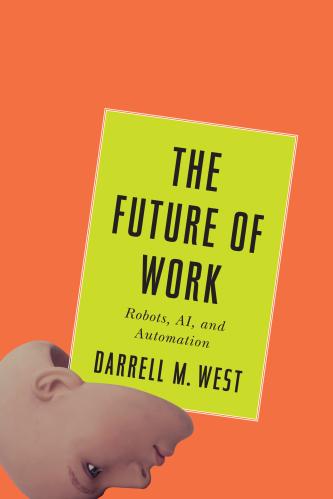Advances in artificial intelligence (AI) are propelling development in many parts of the world. There are new applications in finance, healthcare, transportation, national security, criminal justice, and smart cities, among other areas. Yet as the same time, there are questions about negative impacts on jobs and personal privacy, if AI will make people’s lives easier, whether the government should regulate AI, and how the United States is faring compared to other countries.
To examine attitudes towards AI, researchers at the Brookings Institution undertook an online national survey of 1,535 adult Internet users between May 9 and May 11, 2018. It was overseen May 9 to 11, 2018 by Darrell M. West, vice president of Governance Studies and director of the Center for Technology Innovation at the Brookings Institution and the author of The Future of Work: Robots, AI, and Automation. Responses were weighted using gender, age, and region to match the demographics of the national internet population as estimated by the U.S. Census Bureau’s Current Population Survey.
Positivity
The survey asked a number of questions about artificial intelligence. As shown in the table below 14 percent were very positive about AI, 27 percent were somewhat positive, 23 percent were not very positive, and 36 didn’t know or gave no answer. There were differences based on gender with men (18 percent) being more positive compared to women (10 percent). Older people were slightly less positive about AI than young adults.
Optimism
Twelve percent said they were very optimistic about AI, 29 percent indicated they were somewhat optimistic, 27 percent were not very optimistic, and 32 percent didn’t know or gave no answer. Males (16 percent) were more optimistic about AI than females (9 percent), while those living in the West (30 percent) were the least optimistic about AI.
Worry
Twelve percent said they were very worried about AI, 27 percent indicated they were somewhat worried, 34 percent were not very worried, and 27 percent gave didn’t know or gave no answer. Those in the Northeast (15 percent) were most likely to say they were very worried about AI.
Workforce Impact
There has been considerable controversy over the workforce impact of AI and whether it will create new jobs or reduce the number of jobs. When asked about the employment impact, 12 percent indicated they thought artificial intelligence would create jobs, 13 percent believed it would have no effect on jobs, 38 percent said it would reduce jobs, and 37 percent didn’t know or gave no answer. Men (42 percent) were more likely than women (34 percent) to say AI will reduce jobs. The group most likely to feel that way were people aged 25 to 34 years old as 43 percent of them felt that way.
Privacy
Only 5 percent said they expect artificial intelligence to increase personal privacy, 12 percent felt it would have no effect on personal privacy, 49 percent claim it would reduce personal privacy, and 34 percent didn’t know or gave no answer. Males (54 percent) were more likely than women (44 percent) to believe AI would reduce privacy. The same was true for those aged 55 to 64 years old.
Daily life
When asked how artificial intelligence would affect their day-to-day life, 34 percent said it would make their lives easier, 13 percent said harder, and 53 percent didn’t know or gave no answer. Men (41 percent) were more likely to think AI would make their lives easier than women (28 percent), and those under the age of 35 were most likely to feel that way.
Threat to humans
Thirty-two percent believe that artificial intelligence represents a threat to humanity, while 24 do not and 44 percent didn’t know or gave no answer. Men (35 percent) were more likely than women (28 percent) to feel AI represented a threat. The same was true for those aged 18 to 24 and living in the West.
Government Regulation
The survey inquired about people’s views about government regulation. Forty-two percent said they think the government should regulate artificial intelligence, 17 percent indicated they did not want it to regulate artificial intelligence, and 41 percent didn’t know or gave no answer. Men (48 percent) were more likely than women (37 percent) to support government regulation. The same was true for those aged 35 to 44 years old and people living in the Northeast.
International competition
Twenty-one percent believe the United States is the leading country when it comes to artificial intelligence. This is followed by 19 percent who think Japan, 15 percent who say China, 4 percent South Korea, 4 percent Russia, 2 percent Europe, and 35 percent didn’t know or gave no answer.
Yet there are concerns that the United States may fall behind China, which has committed $150 billion towards its goal of becoming a world leader by 2030. When asked which nation would be the leader in 10 years, 21 percent say the United States, followed by 20 percent who expect China, 14 percent Japan, 4 percent Russia, 3 percent South Korea, 3 percent Europe, and 35 percent didn’t know or gave no answer.
Survey Questions and Answers
1. How positive are you about artificial intelligence?
- 14% very positive
- 27% somewhat positive
- 23% not very positive
- 36% don’t know or no answer
2. How optimistic are you about artificial intelligence?
- 12% very optimistic
- 29% somewhat optimistic
- 27% not very optimistic
- 32% don’t know or no answer
3. How worried are you about artificial intelligence?
- 12% very worried
- 27% somewhat worried
- 34% not very worried
- 27% don’t know no answer
4. Do you expect artificial intelligence to:
- 12% create jobs
- 13% have no effect on jobs
- 38% reduce jobs
- 37% don’t know or no answer
5. Do you expect artificial intelligence to:
- 5% increase personal privacy
- 12% have no effect on personal privacy
- 49% reduce personal privacy
- 34% don’t know or no answer
6. Do you expect artificial intelligence to make your day-to-day life:
- 34% easier
- 13% harder
- 53% don’t know or no answer
7. Do you think artificial intelligence represents a:
- 32% threat to human beings
- 24% no threat to human beings
- 44% don’t know or no answer
8. Do you think government officials should:
- 42% regulate artificial intelligence
- 17% not regulate artificial intelligence
- 41% don’t know or no answer
9. Which one is the leading country when it comes to artificial intelligence?
- 21% United States
- 19% Japan
- 15% China
- 4% South Korea
- 4% Russia
- 2% Europe
- 35% don’t know or no answer (order was randomized)
10. In 10 years, which one will be the leading country when it comes to artificial intelligence?
- 21% United States
- 20% China
- 14% Japan
- 4% Russia
- 3% South Korea
- 3% Europe
- 35% don’t know or no answer (order was randomized)
Gender:
- 53.8% male, 46.2% female in survey
- 47.9% male, 52.1% female in target population
Age:
- 8.8% 18-24, 14.9% 25-34, 18.2% 35-44, 20.8% 45-54, 19.0% 55-64, 18.2% 65+ in survey
- 13.9% 18-24, 19.4% 25-34, 17.8% 35-44, 18.3% 45-54, 16.4% 55-64, 14.2% 65+ in target population
Region:
- 16.4% Northeast, 25.0% Midwest, 36.0% South, 22.5% West in survey
- 18.0% Northeast, 22.0% Midwest, 36.4% South, 23.6% West in target population
Survey Methodology
This online survey polled 1,535 adult Internet users in the United States May 9-11, 2018 through the Google Surveys platform. Responses were weighted using gender, age, and region to match the demographics of the national internet population as estimated by the U.S. Census Bureau’s Current Population Survey.
In the 2012 presidential election, Google Surveys was the second most accurate poll of national surveys as judged by polling expert Nate Silver. In addition, the Pew Research Center undertook a detailed assessment of Google Surveys and found them generally to be representative of the demographic profile of national internet users. In comparing Google Survey results to its own telephone polls on 43 different substantive issues, Pew researchers found a median difference of about three percentage points between Google online surveys and Pew telephone polls. A 2016 analysis of Google Surveys published in the peer-reviewed methodology journal Political Analysis by political scientists at Rice University replicated a number of research results and concluded “GCS [Google Consumer Surveys] is likely to be a useful platform for survey experimentalists.”
This research was made possible by Google Surveys, which donated use of its online survey platform. The questions and findings are solely those of the researchers and not influenced by any donation. For more detailed information on the methodology, see the Google Surveys Whitepaper.
The Brookings Institution is committed to quality, independence, and impact.
We are supported by a diverse array of funders. In line with our values and policies, each Brookings publication represents the sole views of its author(s).














Commentary
Brookings survey finds worries over AI impact on jobs and personal privacy, concern U.S. will fall behind China
May 21, 2018